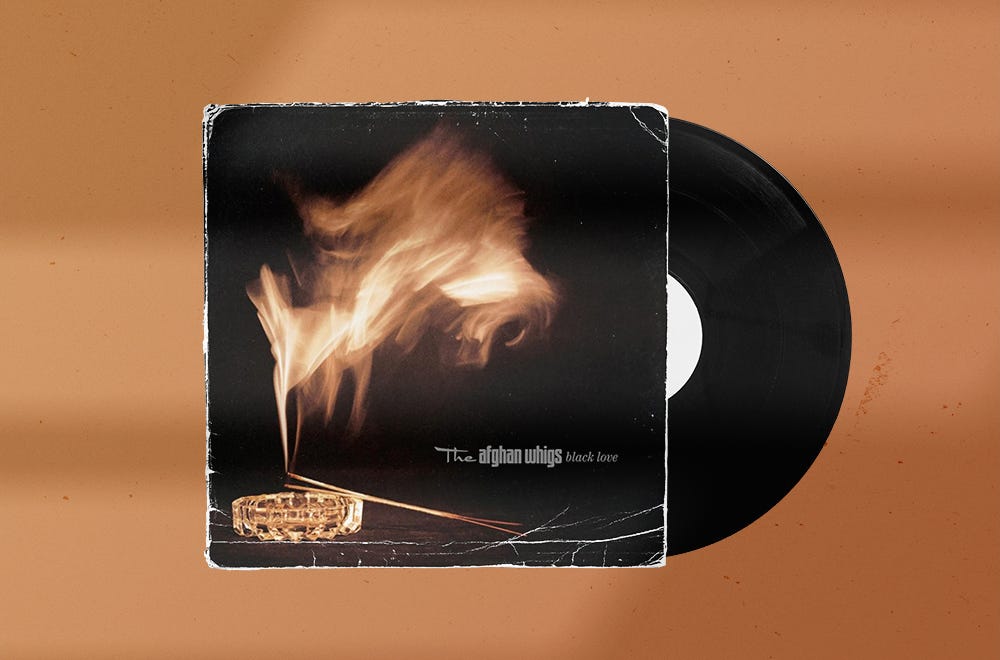Deep Cuts #13: The Afghan Whigs – 'Black Love'
Chasing film noir and Hollywood dreams with soulful shots of liquor and lust.
Artist: The Afghan Whigs
Title: Black Love
Release: March 12th, 1996
Label: Elektra Records
Listen here: Spotify | Youtube
I still remember where I was when I heard this collection of songs for the first time. It’s a locus of discovery forever etched into my brainpan with the rough, raised edges of a permanent cigarette burn.
I was home alone and sitting at my desk, pretending to work a job that I didn’t even remotely care about, one that I would soon leave with the reckless abandon of a flippant afterthought. If I were to take retroactive stock of my mental state at that moment, I was likely emotionally unfulfilled and (at least unconsciously) despondent. Music was my daily escape and I was willing to drift, both literally and figuratively, wherever it would take me.
In terms of my career and sense of personal accomplishment, I was feeling existentially cornered and creatively stifled. I was looking for a way out, a trajectory of radical change, and I was becoming increasingly frustrated at coming up short. Then, one day, a little rock album from the ‘90s made its way into my shuffle queue and the spark I was looking for went off in my brain like a gunshot. This is a story about Black Love.
In an interview with Stereogum, Afghan Whigs frontman Greg Dulli was asked whether there’s a sense of weirdness inherent in the act of listening to the songs he wrote for his previous records, and if there’s a connection between who he was then and the person listening to those songs in the here and now. Dulli’s answer is, unsurprisingly, quite illuminating in its universality:
“It’s different versions of yourself. It’s sort of like looking at photographs of yourself through time like, ‘Wow, did I wear that? Did my hair really look like that?’ It’s whoever you are at a given moment. And the great thing about songs for me is they remind me of times of my life. I can instantly remember experiences, sights, sounds, smells even. It’s a cool trigger to have. It’s a roadmap to my life, especially my life from nineteen on, so… good, bad, ugly, embarrassing, extraordinary, and everything in between.”
When Black Love, the Cincinnati alt-rock outfit’s fifth album was released in early 1996, I was only seven years old. I wouldn’t encounter the album, or the band more generally, until twenty years later at the beginning of 2016, as the record approached its highly-anticipated twentieth-anniversary release. Now, let me tell you, there’s a hell of a lot of “experiences, sights, [and] sounds” going on between seven and twenty-seven. Nonetheless, for me, like Dulli, Black Love remains a phenomenological trigger—and an irrevocably cool one at that.
Turning to questions of fan appreciation of his work with The Afghan Whigs, and how Black Love’s predecessor, Gentlemen (1993), is often heralded as the band’s crowning achievement, Dulli admits that preference plays just as much a part for the artist as it does for the listener:
“That we put something out [Gentlemen] that captured the zeitgeist of a certain moment, that’s fantastic, you know what I mean? That’s lightning in a bottle. But I look at it this way: Thriller may have been Michael Jackson’s most popular album, but it was not my favorite. Things have a way of working themselves out…. I like Achtung Baby better than The Joshua Tree, and that’s not a put-down to The Joshua Tree, it’s just a preference. That’s the cool thing about having a body of work. People have stuff to talk about, lists to make.”
I couldn’t agree more. And in terms of my own personal roadmap, Black Love is far more formative and essential than anything on Gentlemen. So, in keeping with that spirit, I will endeavour to walk us through my experience with Black Love: from the front to back, beginning to end, and everything in between, each track ranked in order of impact and lasting resonance.
11) “Faded”
As the legend goes, Dulli originally conceived of the Black Love narrative as a film noir screenplay. As Joseph Schafer notes for Stereogum:
“After Gentlemen's success, Dulli leveraged his cultural currency toward Hollywood, scoring the soundtrack to Ted Demme's film Beautiful Girls and nabbing a cameo for the Afghan Whigs, performing a cover of “Can’t Get Enough Of Your Love, Babe” on screen. Dulli planned to write, direct, and score his own noir movie, a project that never materialized, but the material intended for the soundtrack went on to become Black Love.”
Like all good albums, “Faded” brings the thematic journey full circle. With the sounds of a man at a metaphysical crossroads, trains glide over steel tracks in the dead of night against haunting and cathartic notes of piano, organ and cello on the album’s melancholic closing track.
John Curley’s wandering bassline and guitarist Rick McCollum’s wahhh’d-out licks add vibrancy to Dulli’s narrative soul-searching: “Lord, lift me out of the night/ Come on, look down/ And see the mess I’m in tonight.”
10) “Night By Candlelight”
Here, the Whigs strip things right back. A simple finger-plucked refrain from McCollum backs up Dulli’s plaintive vocal with an assist from Twilight Singers alum Shawn Smith, as various ensemble instruments—hammered dulcimer, timpani, cello—eventually slide into the mix, bolstering the track’s dramatic range. When things finally coalesce and break open at the end, the track morphs into a sweeping grand ballad that sounds like a tear-jerking church vigil.
9) “Step Into The Light”
After the album’s first third, this track arrives as a much-needed palate cleanser. It's a sweet ballad with delicate hints of country twang. McCollum’s subtle pedal steel accents and Dulli’s additional percussion add rich layers of emotional texture. There’s a deep sense of lyrical yearning going on here and Dulli’s raw vulnerability makes it palpable.
8) “Crime Scene Part One”
This is where it all begins. Given the album’s cinematic origins, the “Scene” of the title is two-fold, crossing diegetic boundaries from the story being told to the real, physical album being played. Train tracks clang in the distance as our protagonist contemplates suicide, hesitating on the edge of oblivion. It’s a real bummer right off the bat, but Dulli knows that when people are this low, that’s when you see what they’re really made of.
Like a great novel or classic film, the opening line is key here too: “Tonight, tonight, I say goodbye/ To everyone who loves me/ Stick it to my enemies tonight/ Then I disappear.” Farewell, devotion, revenge, and absence—it’s all there; the hallmarks of a good story. The mid-section pre-chorus jump builds tension for Dulli’s hook, sinking its teeth into the listener and demanding attention.
7) “Summer’s Kiss”
The more captivating of the album’s traditional ballads, “Summer’s Kiss” starts off with a build-up before drummer Paul Buchignani leads Dulli and McCollum into a full-blown, wall of sound, chord progression. The composition is stripped back and plain, without the additional instrumentation and add-ons adorning the other songs. It’s the most ‘traditional’ Whigs song on the record and, sequenced between the immaculate “Bulletproof” and “Faded,” it helps to bring Black Love’s closing triumvirate to a satisfying and cathartic conclusion.
6) “Honky’s Ladder”
This is Dulli at his most cinematic, a born storyteller and consummate showman. The verse’s noir-influenced lyrics are whipcrack smart and witty, bleeding into a lofty and arresting chorus hook that links back to the narrative pit of despair introduced with Black Love’s protagonist in “Crime Scene Part One.” The track also has a hypnotic lock-step groove with plenty of swing to it, making it one of the more playful tracks on the record. Weird choice for the lead single, though.
5) “Going To Town”
Just a sick mid-tempo foot-stomper. This one always reminds me of an HBO intro theme, like something you’d expect to hear over a credit sequence of highways, old school cars, and washed out city streets on The Sopranos or True Detective/Blood. The addition of clavinet and cello gives the composition a grand theatrical register, which is definitely in keeping with Dulli's cinematic aspirations.
4) “Double Day”
God, I love the bassline thrum on this one. So, so smooth. Combined with Dulli’s swagger on the verse (“drunk with love and other things”), there are layers of seduction and hedonism to his inflection that I’m still trying to parse. (“Get it on,” indeed.) Oh, when Dulli puts some grit into that chorus with backing vocals from Barbara Hunter and Doug Falsetti and just belts out that high croon? Incredible stuff.
3) “My Enemy”
That opening guitar riff from McCollum is iconic. Every time I hear it, it puts this big dumb smile on my face. Just pure rock ‘n’ roll greatness; an absolute stomper right from the get-go.
This track also has some of Dulli’s best lyrical gems—“I hear the whispers, baby/ If what they say is true/ They say I killed the brother/ To fall in love with you” and “These words, I heard them once before/A conversation I believe/ How does a man begin to fall/ When he does practice to deceive?”—that ooze charisma with every primal growl, feeling perfectly matched to the song’s aggressive tempo and swift transitions.
2) “Blame, Etc.”
You know a song is gonna be great when it starts with a big ol’ masculine purr. “Blame, Etc.” is just a straight-up vibe, with Dulli channelling his love for R’n’B, soul, and funk, adding hefty doses of NOLA big-band energy to the band’s sturdy alt-rock foundations.
It’s the type of track you can imagine playing over a hazy saloon, filled with clouds of smoke, sticky floors, questionable characters, and a scuffed up bar in peril of running dry far too soon. Pair this with a monster chorus and Dulli’s sexually-charged existentialism, and you’ve got one of the best Whigs tracks ever recorded and Black Love’s title track—albeit sans the actual title. As Schafer puts it:
“The song was intended as a tribute to the late Temptations singer David Ruffin, whose infidelities become an ideal vehicle for the nastiness Dulli had been writing around since 1991. In many ways, the song is the centerpiece of Black Love—the words of its chorus show up in “Crime Scene Part One,” and, crudely, the co-opting of African American music idioms is as central a theme in the record as film noir and sexual deprivation are—hence the title.”
1) “Bulletproof”
With bursts of organ and clean, straightforward riff progression from McCollum, we arrive at Black Love’s opus, the impeccable “Bulletproof.”
Here, Dulli explores the tension between a love song and singing about love, through love and to love itself. The track is littered with allusions to dreams and phantasms, midnight congress, truth and lies, fatal attractions, and the gut-wrenching ache of loss. And it all turns on Dulli’s powerful chorus, easily one of the best he’s ever penned:
“Every time I dream about you, baby/
With your hands all over me.
I never forget anything/
Don’t forget that I’m asleep.”
On each listen, there’s a moment in the last third outro where Dulli’s croon wavers ever so slightly and then finally breaks into this heartbreaking roar over never letting go, his voice quaking with forlorn resignation and bristling against Chichester’s bright organ and striking piano notes, and it gives me goosebumps every single time.
It’s just… beautiful. Goddammit. “Here we go.”
You can find all of the albums in this series in the TPD // Deep Cuts playlist.







